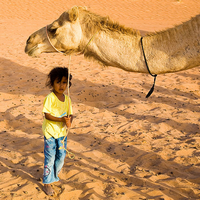Alterman on the underlying challenge posed by globalization's embrace of the Middle East
 Monday, June 21, 2010 at 12:07AM
Monday, June 21, 2010 at 12:07AM  Great Jon Alterman piece in World Politics Review.
Great Jon Alterman piece in World Politics Review.
It is not surprising that discussions with government officials from member states of the Gulf Cooperation Council often dwell heavily on security threats. Terrorism remains a persistent concern of theirs even if some of the urgency they feel has passed. A conventionally armed Iran is a constant source of worry. And the prospect of a nuclear-armed Iran is an unending nightmare.
Yet, among the most-senior leadership, there is also some perspective. The terrorism threat no longer feels existential, as a combination of effective security initiatives, internal cooptation and international cooperation have made their mark. On Iran, there is a sense of fatalism: The Gulf has relied on external guarantors to keep the Iranians at bay since the days of the Portuguese empire, and the Iranians have sufficiently agitated the world to ensure that external guarantors, in some form or another, will remain.
But in private conversations with senior GCC royals last month, it was clear that one security concern does indeed loom large. It is one not of physical security, but of human security. Their nations can almost certainly survive the other threats they face. But unless they can create dynamic, hard-working and creative populations over the long term, these countries will fail.
For the last half-century, the GCC's human security story has been a positive one. After World War II, today's gleaming Gulf capitals were impoverished collections of reed huts. Schooling was uncommon, and fresh water was scarce. Traffic-clogged roads did not exist, because traffic did not exist. Radios were a rarity, in contrast to the ubiquity of the satellite dishes that now deliver more than 500 channels in Arabic. Life expectancies doubled in the 20th century. Malnutrition and the endemic diseases of the 1950s have disappeared, and the diseases of the 2010s -- heart disease, kidney disease and diabetes -- are all diseases, not of poverty, but of plenty. For Gulf Arabs who came of age in the 1960s, the contrast between their youth and their adulthood could not be starker.
What will the future look like for today's youth? It is hard to imagine that they can enjoy a jump in living conditions similar to the one their parents and grandparents experienced, especially as oil and gas markets seem unlikely to expand as much over the next half-century as they did over the last. Much of it comes down to a basic problem of mathematics: Per capita income increased a hundredfold, from $500 in 1960 to $50,000 in 2010; it cannot increase another hundredfold, to $5 million, in the 50 years to come.
Even more importantly, what might drive future growth? There is a growing recognition that oil has wrought about all that it can.
The GCCs are the natural lead geese on this evolution of thinking, so every step they consider or take is worth watching. Because when the world moves beyond oil, all the Middle East is left with are the people as a resource. Nothing that's happened in the past decade has altered that reality; indeed, most of what's happened has accelerated it.
Excellent article.










Reader Comments (2)
Alterman's per capita income comparison with the last fifty years and the coming fifty years is awkward at best, probably misleading, and possibly downright ridiculous. Sufficiency does not necessarily operate on a linear graph. Statistics are critical to analysis but only if properly used. He makes great points until the last few sentences.
Its an interesting idea to ruminate on, what happens when the oil runs out. That's the big problem with a mineral based economy, especially one that is so narrow as reliance on oil alone.
Can the Middle east get its human resource up to scratch, fingers crossed, but I feel that they still lag in terms of education , especially women and as we've talked about, that's the big key.